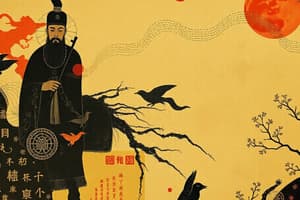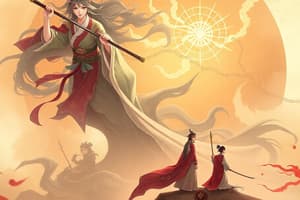Podcast
Questions and Answers
Which principles are at the heart of Confucianism?
Which principles are at the heart of Confucianism?
- Li (correct)
- Dao
- Tao
- Ren (correct)
What does Confucianism emphasize regarding the self?
What does Confucianism emphasize regarding the self?
The self as a social being shaped by relationships and duties.
What does Taoism emphasize?
What does Taoism emphasize?
The concept of the Tao (the Way).
The Book of Changes is one of the texts from the Zhou dynasty.
The Book of Changes is one of the texts from the Zhou dynasty.
Which philosopher is connected to Taoism?
Which philosopher is connected to Taoism?
Lao Tzu wrote the foundational text of Taoism, called the ___.
Lao Tzu wrote the foundational text of Taoism, called the ___.
What does the term 'Wu Wei' refer to in Taoism?
What does the term 'Wu Wei' refer to in Taoism?
What does Zen Buddhism seek through meditation?
What does Zen Buddhism seek through meditation?
Match the following figures with their associated texts:
Match the following figures with their associated texts:
Which term in Confucianism represents humaneness?
Which term in Confucianism represents humaneness?
Confucianism primarily emphasizes individualism over social harmony.
Confucianism primarily emphasizes individualism over social harmony.
What is the main book of Taoism authored by Lao Tzu?
What is the main book of Taoism authored by Lao Tzu?
The philosophy that encourages individuals to align with the natural flow of life is called _______.
The philosophy that encourages individuals to align with the natural flow of life is called _______.
What role do rituals play in Confucianism?
What role do rituals play in Confucianism?
Match the following philosophers with their associated ideas:
Match the following philosophers with their associated ideas:
Lao Tzu was born in 604 B.C.E. and his name means 'old master'.
Lao Tzu was born in 604 B.C.E. and his name means 'old master'.
What is the significance of Wu Wei in Taoism?
What is the significance of Wu Wei in Taoism?
What is the central theme of Chuang Tzu's work?
What is the central theme of Chuang Tzu's work?
Lao Tzu and Chuang Tzu are equally well-known figures in Taoism.
Lao Tzu and Chuang Tzu are equally well-known figures in Taoism.
What is the role of a roshi in Zen Buddhism?
What is the role of a roshi in Zen Buddhism?
The text that expresses Chuang Tzu's philosophies is called the _____
The text that expresses Chuang Tzu's philosophies is called the _____
Match the following practices with their associated aesthetic or philosophical emphasis:
Match the following practices with their associated aesthetic or philosophical emphasis:
Flashcards are hidden until you start studying
Study Notes
Confucianism
- Emphasizes the importance of moral integrity, social harmony, and virtuous relationships.
- Cultivates the concept of Ren (humaneness) and Li (ritual propriety)
- Rituals reinforce social order and moral values, promoting community.
Zhou Dynasty
- Second historical dynasty of China.
- Proliferation of Chinese classical literature, including:
- Book of Changes
- Book of History
- Book of Poetry
- Classic of Rites
- Spring and Autumn Annals
Taoism
- Focuses on the concept of the Tao (the Way), representing the fundamental nature of the universe.
- Key ideals include Wu Wei (non-action) and naturalism.
- Encourages individuals to align with the natural flow of life.
- Taoism has been connected to the philosopher Lao Tzu, who wrote the Tao Te Ching around 500 BCE.
Tao Te Ching
- Authored by Lao Tzu, it is the foundational text of Taoism.
- Contains 81 short chapters dating back to the 3rd century BCE.
- Includes many paradoxes and teachings on living in harmony with nature.
Lao Tzu
- Born in 604 BCE.
- Name means "old master."
- Conceived by a shooting star and born with white hair.
- Worked as a government archivist, but became disillusioned with corruption.
- Left his town after writing the Tao Te Ching in three days.
Chuang Tzu
- Second founder of Taoism, who lived from 369 to 286 BCE.
- Wrote the Chuang Tzu, a text considered as important as the Tao Te Ching, but less known.
- Known for humor, profound lessons, and stories.
- Central theme of his work is the relativity of things: "Who is to say, it asks, exactly what is good, what ought to be done, or even who we are, when answers to such questions are so dependent on particular circumstances?"
Zen Buddhism
- The "meditation school."
- Seeks sudden enlightenment (Satori) through meditation.
- Arrives at emptiness (Sunyata).
- Uses meditation masters (Roshi).
- Emphasizes beauty, art, and aesthetics including:
- Garden
- Archery
- Tea Ceremony
- Calligraphy
Systematic Knowledge
- Strives for coherence and the formulation of a worldview.
- Uses a method to consult information from the total experience.
- Develops biblical character in students' lives (virtue).
- Secures appropriate knowledge of Christ for students.
- Should be lively and appropriate to the learner and needs of the community.
- Attains mastery of the subject within the context of the biblical worldview.
Religious Education
- Emphasizes students loving the Lord God with all their hearts.
- Aimed at helping students articulate the hope that lies within them.
- Parents should view the church as a partner in their children's religious education.
Biblical Quote
- "Train up a child in the way he should go: And when he is old, he will not depart from it." - Proverbs 22:6
Confucianism
- Focuses on the individual as a social being, shaped by relationships and duties.
- Emphasizes Ren (humaneness) and Li (ritual propriety).
- Values moral integrity, social harmony, and virtuous relationships.
- Rituals reinforce social order and moral values, promoting community.
- Central to the development of Chinese Society in the Zhou Dynasty.
Zhou Dynasty
- The second historical dynasty of China.
- The proliferation of Chinese classical literature happened during this dynasty.
- Key texts from this period include: "Book of Changes", "Book of History", "Book of Poetry", "Classic of Rites", and "Spring and Autumn Annals".
Taoism
- Centered on the concept of the Tao (the Way), encompassing the universe's fundamental nature.
- Key ideals include Wu Wei (non-action) and naturalism, encouraging individuals to align with life's natural flow.
- Connected to the philosopher Lao Tzu.
- Believes in spiritual immortality, with the spirit joining the universe after death.
Lao Tzu and the Tao Te Ching
- Born in 604 BCE, his name means "old master".
- Believed to have been conceived by a shooting star.
- Worked as a government archivist but became disenchanted with corruption.
- Authored the Tao Te Ching, a text containing paradoxes and teachings on living in harmony with nature.
Chuang Tzu
- Taoism's second founder, believed to have lived from 369 to 286 BCE.
- Authored "Chuang Tzu", a text considered equally important as the "Tao Te Ching".
- Known for humor, profound lessons, and stories.
- His work focuses on the relativity of things, questioning absolutes and emphasizing the importance of context.
Zen Buddhism
- Known as the "meditation school".
- Seeks sudden enlightenment (satori) through meditation.
- Aims to achieve emptiness (sunyata).
- Utilizes meditation masters (Roshi).
- Emphasizes the use of beauty, art, aesthetics, and practices such as garden design, archery, tea ceremony, and calligraphy.
Christian Education
- Employs a systematic approach to knowledge.
- Strives for coherence and a comprehensive worldview.
- Uses the total experience for information.
- Develops biblical character in students.
- Ensures access to a breadth of knowledge about Christ.
- Should be relevant to the learner and the community.
- Emphasizes mastery of the subject within a biblical framework.
- Fosters a love for God.
- Aims to create effective believers.
- Helps students articulate their hope.
- Views the church as a partner in children's religious education.
Proverb
- "Train up a child in the way he should go, and when he is old, he will not depart from it." (Proverbs 22:6)
Studying That Suits You
Use AI to generate personalized quizzes and flashcards to suit your learning preferences.




